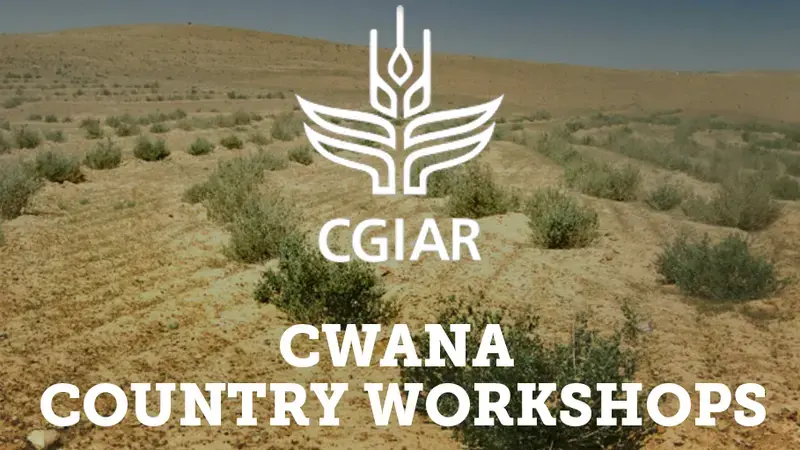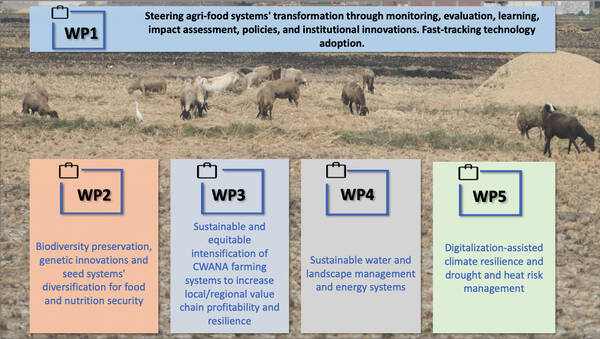Country workshops to discuss the future of CGIAR research in CWANA

Building on the July CWANA consultations, CGIAR is now carrying out a series of country workshops across the region that discuss how the CGIAR CWANA Initiative can benefit individual dryland countries and how CGIAR can build on their vast potential and address their agricultural challenges. The workshops are led by Mr. Aly Abousabaa - Regional Director of Central and West Asia and North Africa (CWANA) and ICARDA Director General, along with Martin Kropff - Global Director of the Resilient Agrifood Systems Science Group, Michel Afram – Board of Trustees Chair for ICARDA and LARI Director-General, and Amgad Elmahdi - IWMI Representative- MENA Region.
The CWANA initiative, also known as “From Fragility to Resilience in Central and West Asia and North Africa (F2R-CWANA)”, aims to transform dryland agri-food systems through a process of consultation, monitoring, impact evaluation, innovation, and addressing of policies. Five work packages within F2R-CWANA address critical actions such as fast-tracking technology adoption in agriculture and research, biodiversity preservation, sustainable water management, delivering gender equality in agriculture, improvement of value chains, and private sector engagement.
Dryland agricultural challenges in countries such as Lebanon, Uzbekistan, Egypt, Sudan, and Morocco, are similar. Yet each country has unique potential, qualities, expertise and attributes, and specific challenges to overcome. CGIAR’s approach to addressing these must be flexible and inclusive, hence the July consultations and continuing country workshops.
There is a wealth of agricultural potential in CWANA. Available and restorable arable land, a workforce that includes an untapped resource of women and youth, a rich pool of plant genetic diversity, and countries keen to develop new technologies and approaches to help drive agricultural growth in economies. The region’s diverse landscape, along with its unique challenges, local knowledge, and CGIAR’s long-term work and relationships, also hold considerable opportunity for dryland science and research relevant to other global dry areas under similar pressures.
Delegates from government and National Agriculture Research and Extension Services (NARES), farmer associations, and scientific experts from CGIAR and other global and regional institutions will attend the workshops. All of these are valued key partners who join CGIAR in a unified approach to address the global “perfect storm” of climate change, exponential population growth, and land degradation and water scarcity, further exacerbated by the global COVID-19 pandemic.

CGIAR is currently evolving through a unified and consolidated approach of its scientific centers and research programs, to transform global food systems from low productivity 'business and usual' approaches to more integrated systems approaches that address long-term challenges, above all climate change. Around thirty targeted ‘initiatives,’ including the F2R-CWANA Initiative, cover the needs of global agricultural research, along with the creation of several new Regional Offices. CGIAR scientists from relevant Centers and Research programs will work within the initiatives to create a more effective and efficient research approach through better knowledge-sharing, expertise, and assets, an economy of scale in funding models, and an overall strengthened structure and unity. By reformulating its partnerships, knowledge, assets, funding, and global presence, CGIAR will deliver greater integration and impact in the face of today’s climate challenges.
The workshops aim to deliver the following:
- An in-depth overview and increased understanding of the country and regional agricultural needs and the direction CGIAR’s scientific initiatives should follow to respond
- Consolidation of regional and country support for a unified approach
- A clearer understanding for countries of the future CGIAR structure and their position and engagement within it
Round One of the workshops will take place over the coming weeks, and Round Two, with other regional countries, will take place soon after. Upon completion, CGIAR and the Countries will have formed a comprehensive overview of CWANA partners, including NARS, government, private sector, farmers, etc., as well as strategies needed. The workshops will also enable CGIAR to deliver targeted contributions based on a clear KPI and joint output structure for each country to facilitate the most effective and efficient impact within available funding.
